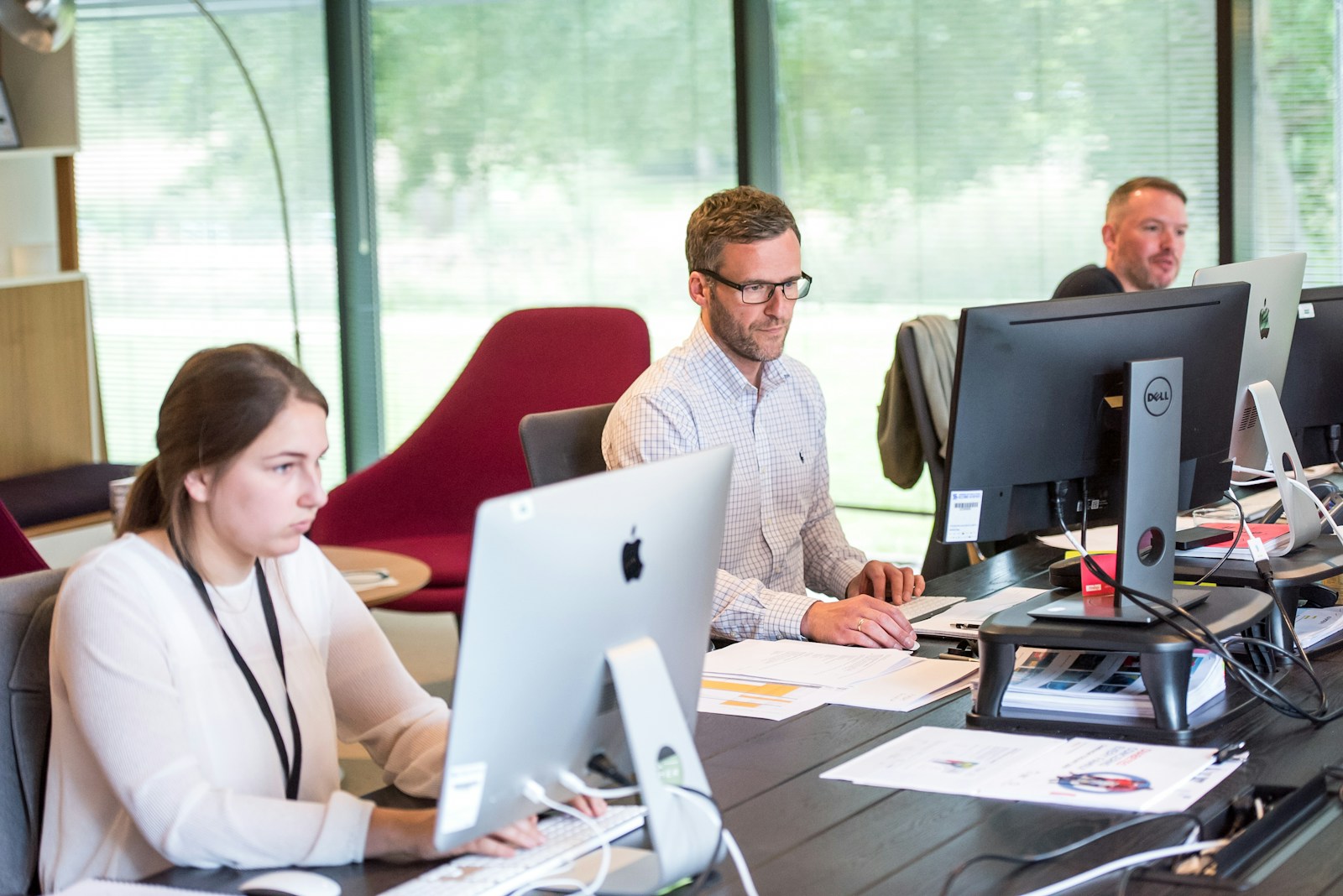20 Jobs for People with Disabilities
Introduction
Finding suitable employment can be challenging for individuals with disabilities. However, with increasing efforts towards inclusivity and accessibility, there are now diverse job opportunities available for people with disabilities. This article aims to highlight 20 different jobs that accommodate individuals with disabilities, providing them with fulfilling and meaningful employment options.
1. Call Center Representative
Individuals with disabilities can excel as call center representatives, as this job allows for effective communication through phone conversations or online chats.
2. Graphic Designer
Creative individuals with disabilities can pursue a career in graphic design, which involves creating visually appealing and engaging designs for various purposes.
3. Transcriptionist
Transcriptionists convert audio recordings into written documents, making it an ideal job for individuals with hearing impairments or who are deaf.
4. Virtual Assistant
Being a virtual assistant allows individuals with disabilities to provide administrative support remotely, assisting clients with tasks such as scheduling appointments and managing emails.
5. Web Developer
People with disabilities who have a knack for coding and web design can consider a career as a web developer, creating and maintaining websites for various clients.
6. Data Entry Specialist
Data entry jobs involve inputting and organizing information, making it suitable for individuals with disabilities who possess good typing skills and attention to detail.
7. Content Writer
Individuals with disabilities who have excellent writing skills can work as content writers, producing engaging and informative articles for various platforms.
8. Tutor
Tutoring offers a flexible job option for individuals with disabilities who excel in a particular subject and enjoy helping others learn.
9. Accountant
Those with good mathematical skills and an eye for detail can pursue a career as an accountant, providing financial services to individuals or businesses.
10. Photographer
Photography allows individuals with disabilities to express their creativity through capturing images, whether in a studio or out in the field.
11. Social Media Manager
With the increasing influence of social media, individuals with disabilities can work as social media managers, creating and managing engaging content for businesses.
12. Customer Service Representative
Customer service representatives assist customers with inquiries, providing support and resolving issues, making it an ideal job for individuals with disabilities.
13. Researcher
Individuals with disabilities who possess strong research skills can work as researchers, conducting investigations and gathering information for various industries.
14. Translator
Those who are bilingual can opt for a career as a translator, converting written or spoken content from one language to another.
15. Administrative Assistant
Administrative assistants provide support to businesses by handling administrative tasks such as scheduling meetings, managing files, and coordinating office activities.
16. Video Editor
Individuals with disabilities who have an eye for detail and an interest in video production can consider a career as a video editor, creating and editing videos for clients.
17. Garden Center Worker
Working in a garden center allows individuals with disabilities to benefit from the calming and therapeutic nature of working with plants and engaging with customers.
18. Medical Coder
Medical coding involves translating medical diagnoses and treatments into codes for billing and record-keeping purposes, making it suitable for individuals with disabilities who possess strong analytical skills.
19. Librarian
Librarians organize and maintain library resources, making it an ideal job for individuals with disabilities who enjoy working in a quiet and structured environment.
20. Fitness Instructor
Individuals with disabilities who have a passion for fitness and wellness can work as fitness instructors, leading exercise classes and helping others achieve their fitness goals.
In today’s inclusive society, there are numerous job opportunities available for individuals with disabilities. The key lies in identifying one’s strengths and interests and pursuing a career that aligns with them. With the right support and accommodations, people with disabilities can thrive in the workplace and contribute to the workforce in meaningful ways.
The Importance of Inclusive Employment Opportunities
People with disabilities face unique challenges when it comes to finding employment. However, it is crucial to recognize the importance of inclusive employment opportunities in fostering a more diverse and equitable workforce. Inclusive employment refers to creating a work environment that embraces and accommodates individuals with disabilities, allowing them to contribute their talents and skills.
One of the primary reasons why inclusive employment is vital is because it promotes social inclusion and reduces discrimination. When individuals with disabilities are given equal chances to participate in the workforce, it helps break down barriers and stereotypes. By embracing diversity, companies can foster a more inclusive culture that values the unique perspectives and abilities of all employees.
Furthermore, inclusive employment opportunities benefit organizations by tapping into an often-overlooked pool of talent. People with disabilities bring a wealth of skills, experiences, and innovative thinking to the workplace. By providing them with appropriate accommodations and support, employers can harness their talents and enhance overall productivity.
From a business perspective, inclusive employment also yields financial benefits. Research has shown that organizations that prioritize diversity and inclusion tend to outperform their competitors. Companies that have a diverse workforce are more likely to generate higher revenue, make better decisions, and foster an inclusive brand image.
Inclusive employment also has a positive impact on the mental health and well-being of individuals with disabilities. Being able to participate in the workforce not only provides financial independence but also boosts self-esteem and a sense of purpose. It allows individuals to develop new skills, build relationships, and contribute to their communities.
Recognizing the importance of inclusive employment, many countries have implemented laws and regulations to promote equal opportunities for individuals with disabilities. These include anti-discrimination legislation, affirmative action measures, and policies that encourage reasonable accommodations in the workplace.
Inclusive employment opportunities are crucial for building a more diverse, equitable, and inclusive society. By embracing the skills and abilities of individuals with disabilities, organizations can create a more innovative workforce, promote social inclusion, and contribute to the well-being of their employees. It is essential for companies to adopt inclusive employment practices that enable everyone to thrive and contribute to the success of the organization.
READ ALSO: 32 Best Jobs For Introverts
Overcoming Barriers in the Workplace for Individuals with Disabilities
Individuals with disabilities face unique challenges when it comes to finding and maintaining employment. Despite these challenges, there are numerous strategies and accommodations that can help overcome barriers in the workplace and ensure equal opportunities for all.
One of the most significant barriers faced by individuals with disabilities is attitudinal bias and misconceptions. Many employers may harbor unfounded concerns about the ability of disabled individuals to perform certain tasks or fulfill specific roles within their organizations. To address this barrier, it is crucial to promote awareness and education regarding the capabilities and qualifications of people with disabilities. By challenging stereotypes and highlighting success stories, employers can shift their attitudes and become more open to hiring individuals with disabilities.
Another significant barrier is the lack of physical accessibility in the workplace. Accessibility encompasses factors such as wheelchair ramps, accessible restrooms, and wider doorways. By ensuring that the physical environment is inclusive and accommodating to people with disabilities, employers can create a more welcoming and accessible workplace. Additionally, employers can provide assistive devices and technologies that enhance the work experience for individuals with disabilities, such as screen readers for visually impaired individuals or modified keyboards for those with limited dexterity.
Furthermore, providing flexibility in work arrangements can help individuals with disabilities overcome barriers related to their specific needs. This flexibility extends to matters such as working hours, remote work options, or modified tasks. By offering reasonable accommodations, employers can enable individuals with disabilities to perform at their best and contribute effectively to the organization.
Training and development programs tailored to the needs of individuals with disabilities also play a crucial role in overcoming barriers in the workplace. By providing specific training on disability etiquette and inclusion, employers can foster a more inclusive work environment. Moreover, establishing mentorship programs can help individuals with disabilities navigate the workplace, access growth opportunities, and build confidence in their abilities.
Legal protections and policies also serve as important tools in overcoming barriers for individuals with disabilities. Laws such as the Americans with Disabilities Act (ADA) provide fundamental rights and protections for disabled individuals in the workplace. Employers must comply with these regulations, which include making reasonable accommodations for disabled employees and prohibiting discrimination based on disability.
Addressing and overcoming barriers in the workplace is essential for creating inclusive employment opportunities for individuals with disabilities. By challenging attitudes, promoting physical accessibility, providing flexible work arrangements, offering tailored training programs, and abiding by legal protections, employers can create a supportive environment that allows individuals with disabilities to thrive and contribute their unique talents.
Strategies for Job Searching with a Disability
Searching for a job can be a daunting task, especially for individuals with disabilities who may encounter additional barriers. However, with the right strategies and resources, it is possible to navigate the job market successfully and find fulfilling employment. Here are some tips for job searching with a disability:
1. Identify Your Strengths and Interests
Before starting your job search, it is essential to identify your strengths, skills, and interests. Understanding what you excel at and what motivates you will help you find a job that aligns with your abilities and passions.
2. Research Disability-Friendly Employers
Not all employers have the same level of commitment to diversity and inclusion. Take the time to research companies and organizations that prioritize hiring individuals with disabilities. Look for companies that have inclusive policies and programs in place to support employees with diverse needs.
3. Utilize Disability-Specific Job Boards
There are several job boards specifically designed for individuals with disabilities. These platforms connect job seekers with employers who are actively seeking to diversify their workforce. Posting your resume and searching for job opportunities on disability-specific job boards can increase your chances of finding employment.
4. Highlight Your Accomplishments
When applying for jobs, focus on showcasing your accomplishments and relevant experiences. Emphasize any certifications, training programs, or projects that demonstrate your skills and abilities. By highlighting your achievements, you can make a strong impression on potential employers.
5. Network and Attend Job Fairs
Networking is crucial for job seekers with disabilities. Attend job fairs, career expos, and networking events to connect with professionals in your desired field. Building relationships with individuals in your industry can help you uncover hidden job opportunities and gain valuable insights.
6. Request Reasonable Accommodations
If you secure an interview or receive a job offer, don’t hesitate to request reasonable accommodations that will enable you to perform your job tasks effectively. The Americans with Disabilities Act (ADA) requires employers to provide reasonable accommodations for individuals with disabilities.
7. Prepare for Interviews
Prior to interviews, research the company and prepare answers to common interview questions. Practice your responses and consider how you can address any concerns or potential misconceptions about your disability. Confidence and preparation can make a significant difference during the interview process.
8. Access Vocational Rehabilitation Services
Vocational rehabilitation services are available to assist individuals with disabilities in their job search endeavors. These services can provide guidance on career exploration, resume writing, interview skills, and job placement. Utilizing vocational rehabilitation services can enhance your job search strategies.
Job searching can be challenging for individuals with disabilities, but with perseverance and effective strategies, it is possible to find meaningful employment. By identifying your strengths, researching disability-friendly employers, utilizing job boards, highlighting your accomplishments, networking, requesting accommodations, preparing for interviews, and accessing vocational rehabilitation services, you can enhance your job search and increase your chances of landing the right job.
Promoting Diversity and Inclusion in the Workforce for Persons with Disabilities
Employment opportunities for individuals with disabilities have significantly improved over the years, thanks to the efforts made towards promoting diversity and inclusion in the workforce. Today, there are various job options available that cater to different skills and abilities. By creating an inclusive work environment, companies can tap into the potential of individuals with disabilities and benefit from their unique perspectives and talents.
- Technology and IT-related Jobs:
With the advancements in technology, there is a growing demand for professionals in the IT sector. Jobs such as software development, website design, and data analysis can be suitable for individuals with disabilities who have a strong aptitude for technology. - Customer Service:
Many companies require customer service representatives to handle inquiries and provide assistance. This role can be fulfilled by individuals with disabilities who possess excellent communication and problem-solving skills. - Graphic Design:
Graphic design offers a creative outlet for individuals with disabilities who have a knack for visual aesthetics. With the right training and software tools, they can contribute to designing logos, brochures, and websites. - Writing and Editing:
Writing content for websites, blogs, or marketing materials is a job that can be done remotely, and it suits individuals with disabilities who have good writing skills and attention to detail. - Social Media Management:
Managing social media accounts involves creating engaging content and interacting with followers. This job can be done from anywhere and allows individuals with disabilities to showcase their creativity and communication skills. - Accounting and Bookkeeping:
Individuals with disabilities who excel in numbers and have excellent organizational skills can pursue a career in accounting or bookkeeping. These roles often require attention to detail and accuracy. - Transcription Services:
Transcription involves converting audio or video files into written form. Individuals with hearing impairments can leverage their skills in this job, producing accurate transcriptions for businesses and various industries. - Virtual Assisting:
Virtual assistants provide administrative support remotely, performing tasks like scheduling appointments, managing emails, and organizing documents. This job can be ideal for individuals with disabilities seeking flexible work arrangements. - Photography:
With the advent of digital cameras and post-processing software, photography has become a viable career option for individuals with disabilities. They can specialize in various genres, from nature photography to event coverage. - Financial Planning:
Individuals with disabilities who possess strong analytical and interpersonal skills can venture into financial planning. Assisting clients in managing their finances and investments can be a rewarding and fulfilling role. - Research and Analysis:
Research and analysis positions exist in numerous industries, including market research, scientific research, and policy analysis. Individuals with disabilities can contribute their analytical thinking and attention to detail to these roles. - Artisan Crafts:
For individuals with disabilities with artistic talents, creating and selling handmade crafts can provide a source of income. Online platforms and marketplaces offer opportunities to showcase and sell these unique products. - Tutoring and Teaching:
Individuals with disabilities who have expertise in specific subjects can offer tutoring services or consider teaching positions. This can be done online or in traditional educational settings. - Human Resources:
Companies value the importance of diversity and inclusion, and individuals with disabilities can play a vital role in their human resources departments, contributing to hiring practices and fostering an inclusive work environment. - Event Planning:
The ability to organize and manage events can make event planning a suitable job for individuals with disabilities. Attention to detail, creativity, and excellent communication skills are essential for success in this field. - Physical Therapy:
Individuals with disabilities who have undergone physical therapy themselves can pursue a career in this field. By leveraging their personal experiences, they can empathize with and help others on their own rehabilitation journeys. - Personal Coaching:
Personal coaching involves supporting and guiding individuals in achieving their personal or professional goals. Individuals with disabilities who have overcome challenges can inspire and mentor others facing similar circumstances. - Gardening and Landscaping:
Gardening and landscaping jobs can be physically demanding but also rewarding. Individuals with disabilities who enjoy working outdoors and have a passion for plants can consider this occupation, adapting their methods to accommodate their specific needs. - Translation and Interpretation:
Individuals with disabilities who are bilingual or multilingual can offer translation and interpretation services, bridging the language barrier for businesses and organizations across different industries. - Dog Training:
Training dogs requires patience, consistency, and a good understanding of animal behavior. Dog training can be a fulfilling job for individuals with disabilities who possess these qualities and have a special connection with animals.
Promoting diversity and inclusion in the workforce involves recognizing and harnessing the unique skills and perspectives that individuals with disabilities bring. By providing equal opportunities and removing barriers, companies can build a more inclusive and productive work environment. With suitable job options available, individuals with disabilities can excel and contribute to various industries, making a positive impact on both their professional lives and society as a whole.
Conclusion
In today’s society, there is a growing recognition of the need for inclusive employment opportunities for individuals with disabilities. As discussed in this article, there are 20 jobs that are well-suited for people with disabilities, providing them with the opportunity to showcase their skills and contribute to the workforce in meaningful ways. These jobs span various industries and offer a range of flexible work options to accommodate different abilities and needs.
One of the significant benefits of inclusive employment is the promotion of diversity in the workforce. By embracing individuals with disabilities, companies can tap into a pool of talent that brings unique perspectives and experiences to the table. This diversity fosters creativity, innovation, and problem-solving, enhancing the overall productivity and success of organizations.
However, it is essential to acknowledge and address the barriers that individuals with disabilities face when seeking employment. From physical accessibility to unconscious biases, there are numerous obstacles that need to be overcome. Employers and society as a whole must strive towards creating an inclusive environment where these barriers are eliminated, and everyone is given an equal opportunity to thrive.
Job search strategies are crucial for anyone looking for employment, and individuals with disabilities can benefit from tailored approaches. By leveraging their strengths, networking, and utilizing disability-specific job platforms, they can increase their chances of finding suitable employment opportunities. Additionally, self-advocacy skills and a positive mindset play vital roles in navigating the job market and securing fulfilling careers.
Promoting diversity and inclusion in the workforce requires the active collaboration of various stakeholders, including employers, educators, policymakers, and disability advocates. It involves raising awareness about the abilities and potential of individuals with disabilities, dispelling stereotypes, and implementing inclusive policies and practices. By fostering an inclusive culture that embraces the talents of all individuals, we can create a fairer and more equitable society.
The importance of inclusive employment opportunities for people with disabilities cannot be overstated. By recognizing their potential, providing suitable job options, and addressing barriers, we can unlock the untapped talents and skills of individuals with disabilities. Through concerted efforts to promote diversity and inclusion in the workforce, we can build a society where everyone has an equal chance to thrive and contribute their unique abilities. It is in this inclusive and supportive environment that the true potential of individuals with disabilities can be unleashed, benefiting both individuals and society as a whole.
Originally posted 2024-02-03 18:50:23.



